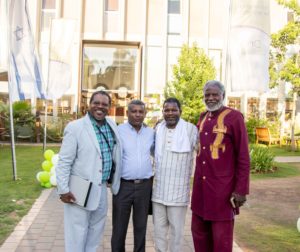While in Israel we met with a cross-section of scholars, administrators, and students who are interested in knowing more about Black Jews and establishing closer relationships with us. Professor Tova Hartman is the Dean of Humanities at Kiryat Ono Academic College. She has a long and distinguished career in academia that includes Harvard, Hebrew University, and Bar Ilan University. She is also a leading feminist and social justice advocate. We meet at Prof. Hartman’s home in Jerusalem with a number of her colleagues in different fields. We discussed how the existence of Black Jews raises a myriad of interesting questions surrounding Jewish identity in general, notions of perceived whiteness, racial characteristics in early rabbinic literature, and how the psychology of race, gender, and religion intersect when considering our communities. Prof. Hartman suggested that we might be able to develop academic programs, conferences, and symposia that examined these deeper issues while bringing people closer together in the process.
Our next meeting took place on the campus of Ono Academic College. There we met with Mr. Zeev Kasso, a successful Ethiopian lawyer who is now the director of the Ethiopian-Israeli Students Program at Ono. This program is devoted to helping Ethiopian-Israelis train for careers in such professions as business, engineering, and technology. He was generous with his time and extremely curious about Black Jews. Mr. Kasso explained that traditionally Ethiopian Jews lived in such isolation from the outside world that most of them are completely unaware of the fact that there are other Jewish communities of African descent. Nothing in their Jewish education in Israel teaches them about Black Jews in various parts of Africa and the United States. Mr. Kasso is interested in building bridges between our communities. We discussed the possibility of returning to Israel to give a lecture with pictures and video about Black Jews around the world. It is vitally important that the 150,000 Ethiopian Jews living in Israel today understand that they are not alone.

